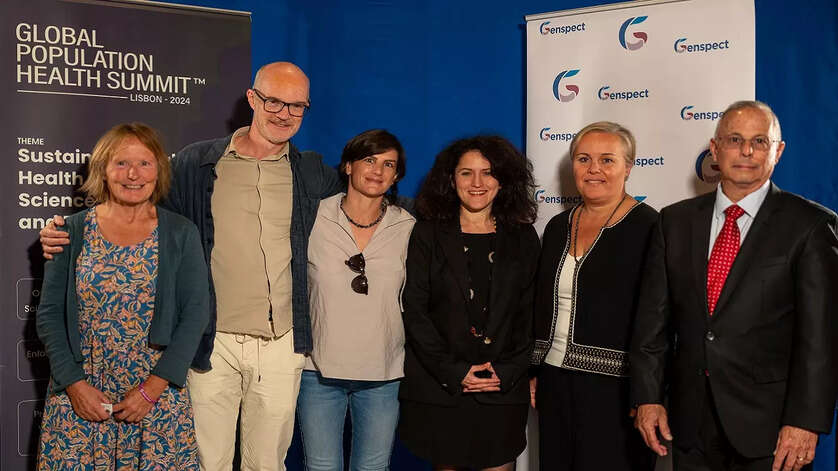- News
- Sustaining health through science, education, and family values: GPHS leads the dialogue at Genspect's Lisbon Conference
Sustaining health through science, education, and family values: GPHS leads the dialogue at Genspect's Lisbon Conference
The Global Population Health Summit (GPHS) took center stage at Genspect’s Annual Bigger Picture Conference in Lisbon, Portugal, under the theme “Sustaining Population Health through Science, Education, and Family Values.” The event marked the successful conclusion of its third edition, following closed sessions held in New York City and Lisbon last year.
This three-day conference united over 500 participants, both virtual and in-person, including scientists, researchers, medical practitioners, legal professionals, psychologists, sociologists, educators, feminists, and detransitioners. Discussions critically examined the evidence base for gender medicine while addressing the challenges posed by gender identity ideologies and their societal impact.

The GPHS emphasised the importance of evidence-based approaches to gender identity care and its health implications, striving to create a more inclusive and supportive society. The event highlighted the consequences of swiftly implementing gender-affirmative care for young people and underscored the need for comprehensive assessments and research-driven treatments.
More than 54 speakers, including eight international keynote speakers from GPHS, contributed to the conference’s 40 scientific sessions. These sessions explored topics related to gender identity, its effects on families and societies, and strategies for sustainable population health. Among the notable speakers were Prof. Peter J. Pitts, Stephanie Davies-Arai from Transgender Trend, Natalya Murakhver of Restore Childhood, and psychiatrist Dr. Sven Román. Their discussions focused on the pivotal roles of parents, evidence-based healthcare, and the influence of education and health policies on family dynamics.

A multidisciplinary approach to gender identity challenges was a recurring theme, with experts advocating for collaboration among healthcare professionals, educators, and advocates. Effective support, panelists noted, requires addressing not only the medical aspects of gender identity but also psychological and social dimensions. Continued education and training for professionals were highlighted as essential to empower individuals navigating these challenges.
Prof. Peter J. Pitts, Scientific Chairman of GPHS and President of the Center for Medicine in the Public Interest, emphasised the importance of valuing traditional family structures while addressing the complexities of gender identity. “Science evolves, and it is frustrating when issues remain unresolved due to resistance to scientific findings. Our focus should be on improving outcomes for children in distress, emphasizing holistic care and thoughtful diagnoses,” he said.

The GPHS session also tackled the vital role of free expression in mental health practices. Open dialogue, the speakers emphasized, fosters innovation and safeguards human rights. Many professionals voiced concerns over fear of retribution, which can stifle discussion, limit research opportunities, and compromise the quality of care. The consensus called for policies that encourage constructive dialogue and scientific inquiry.
Family structures and values emerged as a key focus during the conference. Presentations underscored the importance of strong family units in promoting health and preventing disease. Families, it was noted, serve as critical entry points for public health interventions, influencing behaviors and outcomes over time. Addressing social determinants of health, such as socioeconomic status, education, and community resources, was deemed crucial for reinforcing family stability and enhancing population health outcomes.
The final sessions highlighted the disruptive effects of societal stigma and economic challenges on family stability. Panelists stressed strategies to strengthen family connections and encourage positive health behaviors as essential components of public health practice. Additionally, a reassessment of current gender identity practices was urged to prioritize patient safety and evidence-based care. By focusing on family dynamics and comprehensive research, communities can foster resilience and improve population health.
The Lisbon 2024 Declaration for Sustainable Population Health further solidified the conference’s commitment to addressing contemporary public health challenges. Accredited by the International Congress for Health Specialties (ICHS), the conference also offered eight Continuing Medical Education (CME) credits, reflecting its dedication to professional development and high-quality education.
For more information about the Genspect Lisbon Conference, click .
For details on the Global Population Health Summit and the Lisbon 2024 Declaration for Sustainable Population Health, click .
Disclaimer: The article has been produced on behalf of GPHS by the Times Internet's Spotlight team.
End of Article
FOLLOW US ON SOCIAL MEDIA
